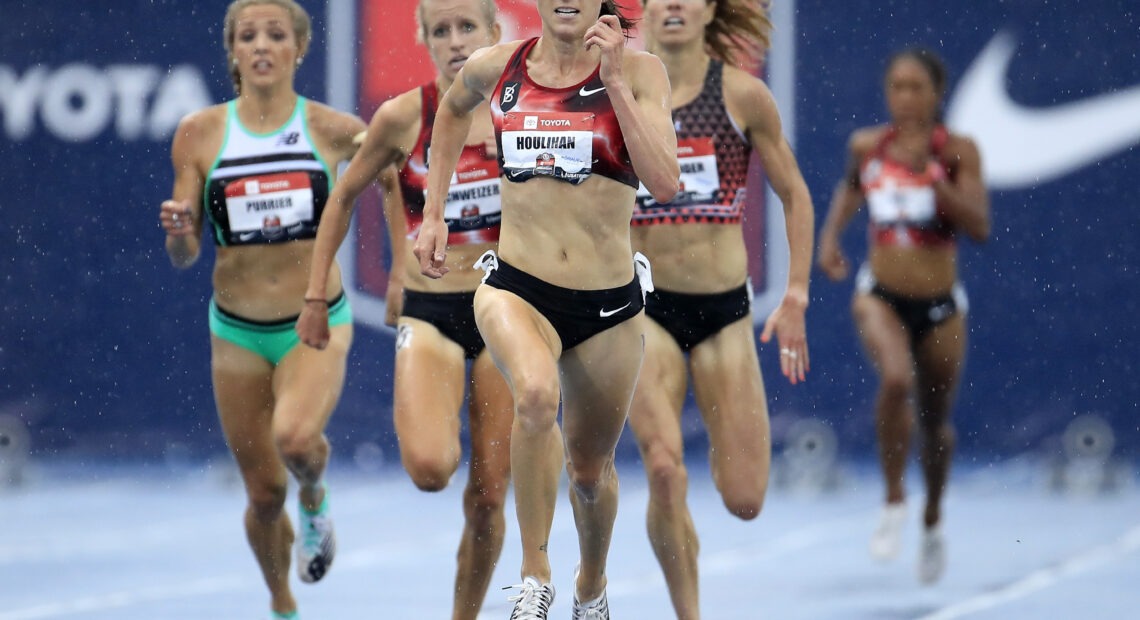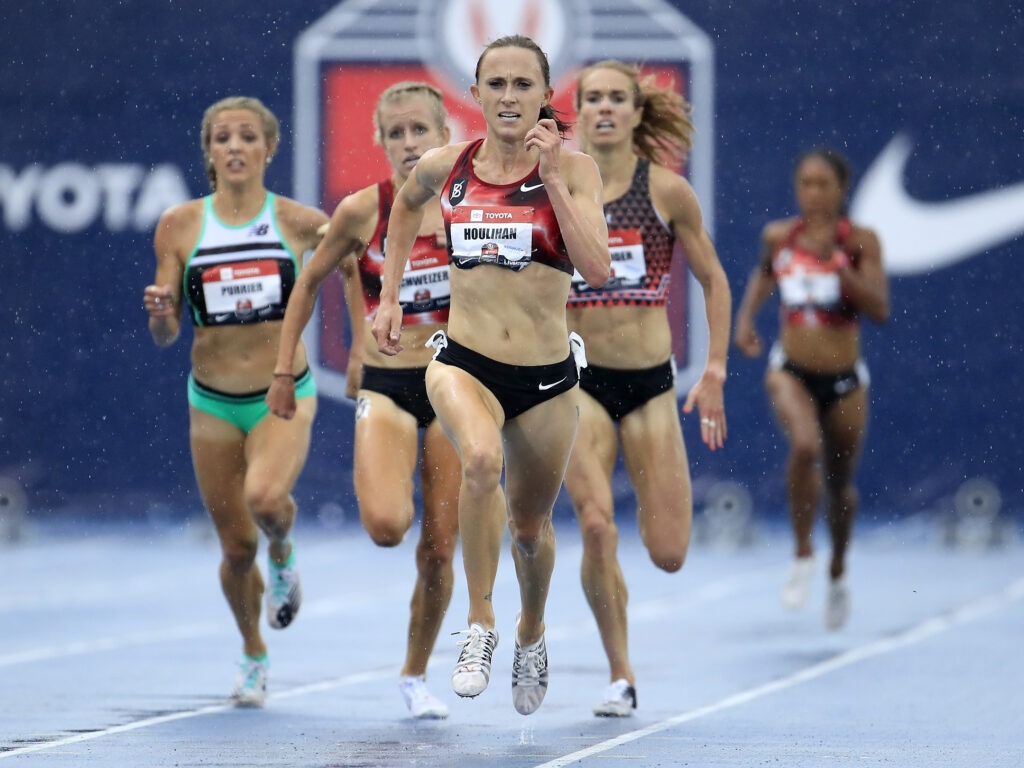
An Olympic Hopeful Says Her Pork Burrito Is To Blame For Her Positive Drug Test
BY BILL CHAPPELL
Shelby Houlihan, the middle-distance runner who currently holds two U.S. records, says she’s been banned from the Tokyo Olympics after testing positive for the steroid nandrolone. Houlihan says she’s clean and is blaming the test result on a pork burrito she got from a food truck.
Anti-doping officials don’t agree with the runner. They’ve handed Houlihan a four-year ban, just before U.S. Olympic trials for the track and field team will begin in Eugene, Ore., this weekend.
“I feel completely devastated, lost, broken, angry, confused and betrayed by the very sport that I’ve loved and poured myself into just to see how good I was,” Houlihan said in an announcement on her Instagram feed.
Houlihan, 28, is now banned from this year’s Summer Olympics as well as the Paris Olympics in 2024. She pledged to fight the ban, which would sideline her during what could be the prime years of her career.
“I’m going to continue to fight to prove my innocence,” Houlihan said during an emotional virtual news conference. “I absolutely respect and wholeheartedly support the fight to catch athletes who disrespect the sport by cheating and doping. But I’m not one of them.”
What experts are making of the pork-steroid link
Houlihan was given a provisional suspension in January, when the Athletics Integrity Unit informed her that a test sample from Dec. 15, 2020, had come back positive for nandrolone. Since then, she said, she’s tried to establish her innocence in a variety of ways, including a food log she compiled after learning of the test result. The AIU was created in 2017 to independently oversee anti-doping efforts in international track and field athletics.

“I feel completely devastated, lost, broken, angry, confused and betrayed,” says middle distance runner Shelby Houlihan, announcing her four-year ban from international competition.
Andy Lyons/Getty Images
After reviewing what she ate, Houlihan said, “We concluded that the most likely explanation was a burrito purchased and consumed approximately 10 hours before that drug test from an authentic Mexican food truck that serves pig offal near my house in Beaverton, Oregon.”
Houlihan is now pointing to studies that show nandrolone occurs naturally in some pigs.
Experts who spoke with NPR say a link is possible, but is not so clear-cut.
Keeve Nachman, Ph.D., who is an associate professor at the Johns Hopkins Bloomberg School of Public Health, says the steroid would be unlikely to be found in pork.
“Nandrolone is not approved for use in any food animal,” said Nachman, noting that it’s illegal to use any steroid hormones in pig production. “We use them in cattle and sheep, and that’s it.”
“The only way it would be there is if it occurred naturally,” he said. “And I don’t know that that’s the case.”
While Nachman is not an expert on anabolic steroids, he is an authority on the drugs that are used in animal production, especially for pork, chicken and other meats.
Dr. Heather Fowler, who leads the National Pork Board’s division of producer and public health, says that while uncastrated boars have been linked to nandrolone test results in the past, the meat from those animals makes up only a sliver of the market.
“Some research suggests the naturally occurring hormones in the meat and organs from intact male pigs (boars) can impact nandrolone test results,” Fowler said, “but the vast majority of the pork consumed in the U.S. does not come from boars.”
Referring to that same research, Nachman noted that most male piglets raised in the U.S. are barrows — castrated males.
“Non-castrated pigs are less appealing in taste,” he said.
Houlihan says the testing process was flawed
Houlihan and the coaches at her track club in Oregon say they’d never heard of nandrolone before learning of a positive out-of-competition test result in January. They say Houlihan is being punished due to a flawed testing process.
“I want to be very clear. I have never taken any performance enhancing substances. And that includes that of which I am being accused,” she said.
Houlihan said she has passed a polygraph test and had a hair sample analysis done that, she says, found no buildup of the steroid in her body. She did not respond to a request for comment on Tuesday.
Jerry Schumacher, the coach at the Bowerman Track Club where Houlihan trains, says she’s the victim of a broken system.
“Throughout this process we were confident that the truth would lead to justice,” Schumacher said. “What I’ve come to learn instead is that anti-doping authorities are okay with convicting innocent athletes so long as 9 out of 10 convictions are legitimate.”
Schumacher says Houlihan’s case resembles those of other U.S. track stars such as Ajeé Wilson and Jarrion Lawson — both of whom were banned due to failed doping tests but were later cleared after officials determined they had eaten tainted beef.
Houlihan says no follow-up tests were done to determine whether her initial result was due to an anomaly.
“Although my levels were consistent with those of subjects in studies who were tested 10 hours after eating this source and WADA technical guidelines require the lab to consider it when analyzing nandrolone, the lab never accounted for this possibility,” Houlihan said, referring to the World Anti-Doping Agency.
A promising career is derailed
Houlihan was told on June 11 that the Court of Arbitration for Sport had rejected her explanation, resulting in a four-year ban. The court confirmed Tuesday that it had found her guilty after an online hearing on June 4.
The court said its panel of judges “unanimously determined that Shelby Houlihan had failed, on the balance of probability, to establish the source of the prohibited substance.”
It also said that a majority of its panel agreed that Houlihan had not succeeded in proving her claim that the testing process for her sample was mishandled.
Houlihan had been hoping to return to the Olympics, having competed in Rio de Janeiro in 2016 after a decorated career at Arizona State University. In recent years, she has set U.S. records in the 1,500 meters and the 5,000 meters, and she seemed to be gathering momentum to vie for a medal this summer. But now her dream of going to the Tokyo Olympics is essentially over.
The runner says she plans to appeal the court’s decision.
“I believe in the sport and pushing your body to the limit just to see where the limit is,” she said. “I’m not interested in cheating. I don’t do this for the accolades, money, or for people to know my name. I do this because I love it. I have so much fun doing it and it’s always the best part of my day.”















